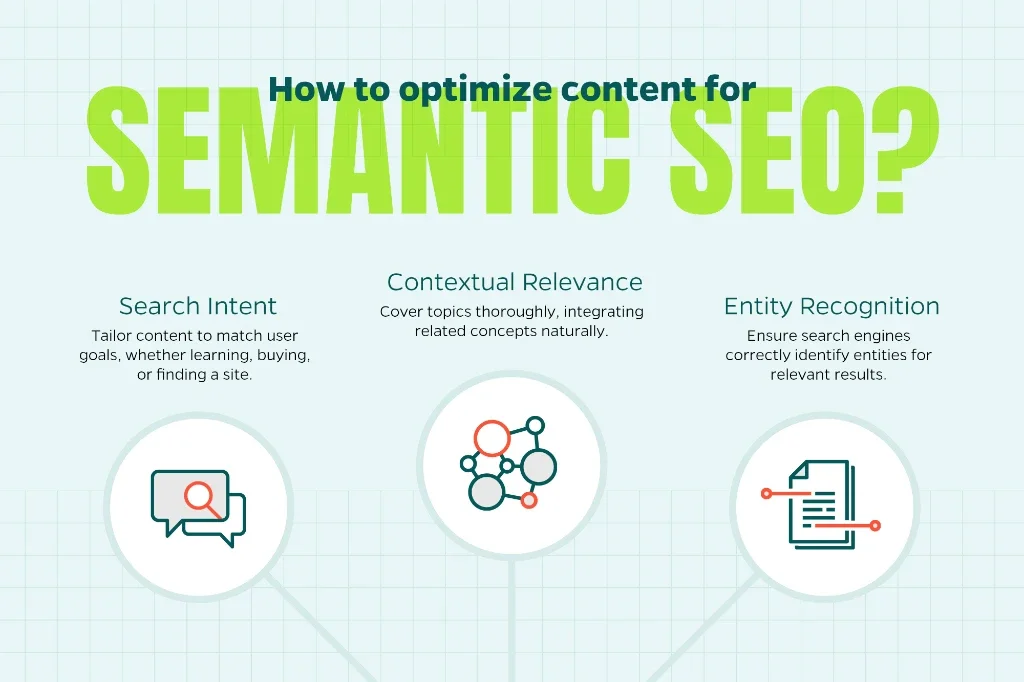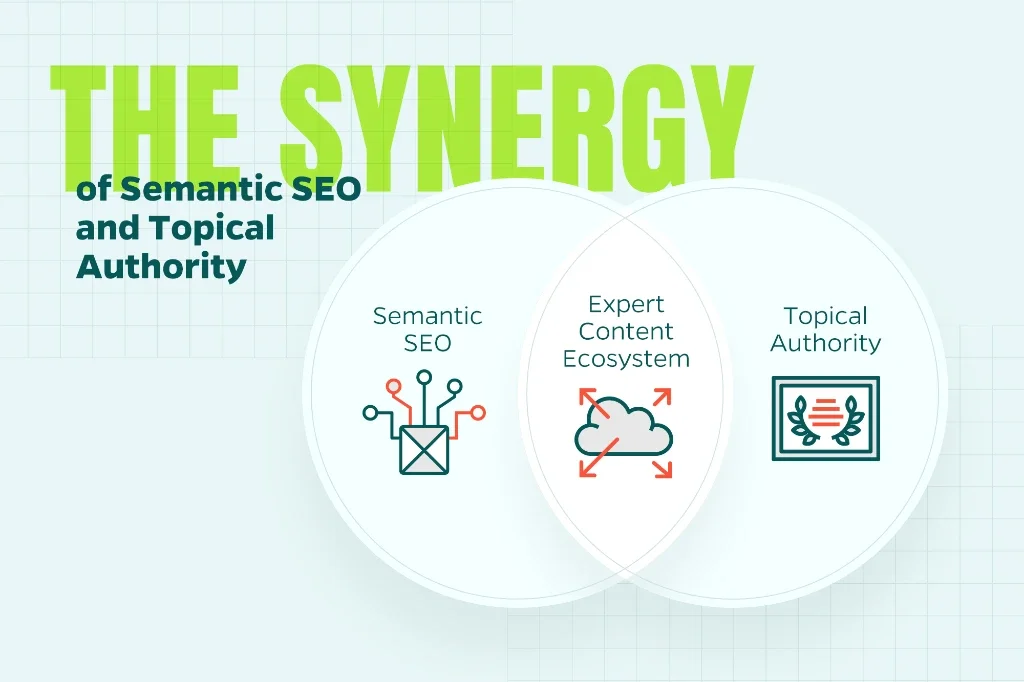For many years, SEO was all about cramming as many keywords as possible into your content. Today, search engines like Google and Bing have gotten a lot smarter, thanks to Semantic SEO and topical authority. They now dig deeper, focusing on the context and intent behind every search.
Consequently, your own strategy for Semantic SEO should go beyond just matching keywords; it needs to understand the connections between topics and deliver content that truly answers user questions. Are you ready to rank higher and captivate your readers? In this post, we will explore how Semantic SEO and topical authority can supercharge your content strategy.
What Is Semantic SEO?
Semantic SEO is the practice of optimizing your content to align with how modern search engines understand and process searches. It’s about creating content that reflects user intent, context, and topical connections, going far beyond simple keyword matching.
For example, if someone searches “healthy meal prep,” they likely want more than just recipes—they might need tips on portion control, ingredient swaps, or time-saving hacks. Semantic SEO ensures your content addresses these deeper needs, delivering answers that truly resonate with searchers.
Here’s what powers Semantic SEO:
- Search Intent: Understand whether users want to learn, buy, or find a specific site, and tailor your content to their goals.
- Contextual Relevance: Cover a topic thoroughly, weaving in related concepts naturally. For example, a post on “social media marketing” should dive into content calendars, audience engagement, and ad targeting—not just repeat the phrase.
- Entity Recognition: Search engines use tools like Google’s Knowledge Graph to identify specific entities (e.g., distinguishing “Apple” the tech company from “apple” the fruit), ensuring users get contextually relevant results.

Why Semantic SEO Matters
Search engines have evolved dramatically. With updates like Google’s Hummingbird (2013), BERT (2019), and MUM (2021), the focus has shifted from rigid keyword matching to grasping natural language and user intent. This ensures users find results that truly fit their needs. As a result, your content must adapt and provide these answers to stay relevant with modern search engine algorithms.
Take someone searching “yoga,” as an example. Google can discern whether they’re after beginner poses, nearby studios, or yoga gear, depending on the context. Semantic SEO aligns your content with these intelligent algorithms, helping it surface for the right searches while delivering genuine value to users.
What Is Topical Authority?
Topical authority is about proving to search engines—and your audience—that your website is the expert on a specific subject. It’s not just about one stellar blog post; it’s about building a comprehensive library of content that covers a topic in depth. Think of it like becoming the Wikipedia of your niche—credible, thorough, and trusted.
Let’s say you are a home improvement retailer. Rather than just posting one article on “home renovation ideas,” you should create a network of content covering kitchen remodeling, bathroom upgrades, outdoor landscaping, DIY tips, and tool guides—all linked together strategically. This depth demonstrates to search engines that you’re a go-to authority, boosting your rankings.
How Semantic SEO and Topical Authority Team Up
Semantic SEO and topical authority are a perfect pair. Semantic SEO helps search engines see the connections between your content pieces, while topical authority provides the robust foundation of content to make those connections meaningful. Together, they create a content ecosystem that signals expertise.

A great way to achieve this is through topical clusters. Here’s an example of how that could look for a financial advisory firm:
- Pillar Page: A detailed resource titled “The Ultimate Guide to Personal Finance.”
- Cluster Content: Targeted posts covering subtopics such as “How to Start Investing in 2025,” “Tips for Retirement Planning,” or “Understanding Cryptocurrency for Beginners.”
- Internal Linking: Connect these pages with intentional links to help clients and search engines navigate your content, establishing your credibility in financial advice.
This structure helps search engines understand your site’s depth and relevance, while users get a seamless experience exploring related topics.
The Benefits of Getting It Right
When you nail Semantic SEO and topical authority, the rewards are significant:
- Broader Keyword Rankings: You’ll rank for a wide range of related terms, even ones you didn’t directly target.
- Featured Snippets and “People Also Ask”: Your content is more likely to appear in these high-visibility spots.
- Better AI Visibility: As AI continues to gain a more prominent role in search, your content will be better optimized to be picked up in Google’s AI Mode or ChatGPT, for example.
- Better User Engagement: Comprehensive content keeps visitors on your site longer, reducing bounce rates and boosting conversions.
- Long-Term Value: Unlike fleeting keyword trends, topical authority builds lasting trust with search engines, keeping your rankings stable.
How to Build Topical Authority with Semantic SEO
Ready to get started? Here’s a practical roadmap and tools:
- Research Topics, Not Just Keywords: Use tools like Ahrefs, SEMrush, or BrightEdge to find themes and related concepts your audience cares about. Check Google’s “People Also Ask” for ideas on what users want to know.
- Create a Content Hub: As stated above, you can build a pillar page on a core topic, then support it with detailed cluster content. For example, a pillar page on “content marketing” could link to posts about blog strategies, video content, and social media campaigns.
- Use Structured Data: Add schema markup to help search engines categorize your content (e.g., marking a page as an article, product, or FAQ).
- Leverage NLP Tools: Platforms like Surfer or Clearscope can suggest related terms to make your content more comprehensive.
- Link Strategically: Use internal links with clear, descriptive anchor text to connect related pages, making it easy for users and search engines to navigate your expertise.
- Keep It Fresh: Regularly update your content to reflect new trends and user needs. Use Google Analytics to spot gaps or underperforming pages.
Mistakes to Avoid
Conversely, you should try to avoid these common traps that can derail your Semantic SEO and topical authority efforts:
Chasing Exact Keywords: Many businesses still get stuck in the old mindset of targeting specific phrases rather than focusing on comprehensive topic coverage. This approach ignores the bigger picture of user intent and semantic relationships. Instead of obsessing over exact match keywords, think about the full spectrum of questions and needs your audience has around a topic. Create content that addresses these broader themes naturally.
Creating Thin Content: Perhaps the biggest mistake is publishing superficial content that simply name-drops keywords without providing real depth or value. Search engines can easily distinguish between content that truly covers a topic and content that just checks keyword boxes. Thin content doesn’t build topical authority—it undermines it by signaling to search engines that your site lacks expertise. Aim for comprehensive coverage that genuinely helps users solve problems or find information.
Neglecting Internal Links: Without strategic internal linking, your content exists in isolation, like having individual books scattered around without any organization system. Internal links are crucial for demonstrating topical relationships and helping both users and search engines understand how your content pieces connect. Many sites miss opportunities to link between semantically related pages, weakening their topical authority signals. Your internal linking should tell a story about your expertise and guide users naturally through related information.
Ignoring Structured Data: Schema markup is a form of structured data—a standardized code you add to your website to help search engines better understand your content. It acts like a digital label, clearly defining what your content is about, whether it’s an article, product, event, person, or organization. Think of it as giving search engines a cheat sheet to categorize and interpret your pages more accurately.
Schema markup might seem technical and intimidating, but it’s one of the most effective ways to help search engines understand your content context. Many businesses skip this step entirely, missing out on enhanced search visibility. Structured data is like providing a detailed table of contents for search engines—it clarifies exactly what your content covers and how it should be categorized.
Publishing Without a Content Strategy: Random content creation without a cohesive plan is another common pitfall. True topical authority requires intentional content planning that identifies gaps, maps out pillar and cluster relationships, and ensures comprehensive topic coverage. Without this strategic approach, you might end up with content silos that don’t reinforce each other or demonstrate true expertise in any area.
Overlooking Content Updates: Publishing content and never touching it again is a mistake in today’s dynamic search environment. User needs evolve, new information emerges, and search algorithms continue to change. Regularly auditing and updating your existing content keeps it relevant and maintains your topical authority over time. Fresh, current content signals to search engines that your site remains an active, reliable source of information.
Final Thoughts
Semantic SEO and topical authority aren’t just buzzwords—they’re the future of search. By focusing on user intent, context, and comprehensive content, you’re not just playing the SEO game; you’re building a resource that people (and search engines) trust. It takes planning and effort, but the result is a website that ranks higher, engages better, and converts more.
Want to see how your content measures up? A content audit can uncover gaps and opportunities to strengthen your topical authority. Or, if you’re ready to take your SEO strategy to the next level, you can contact Straight North’s experts to craft a tailored plan to boost your visibility and drive real business results.








